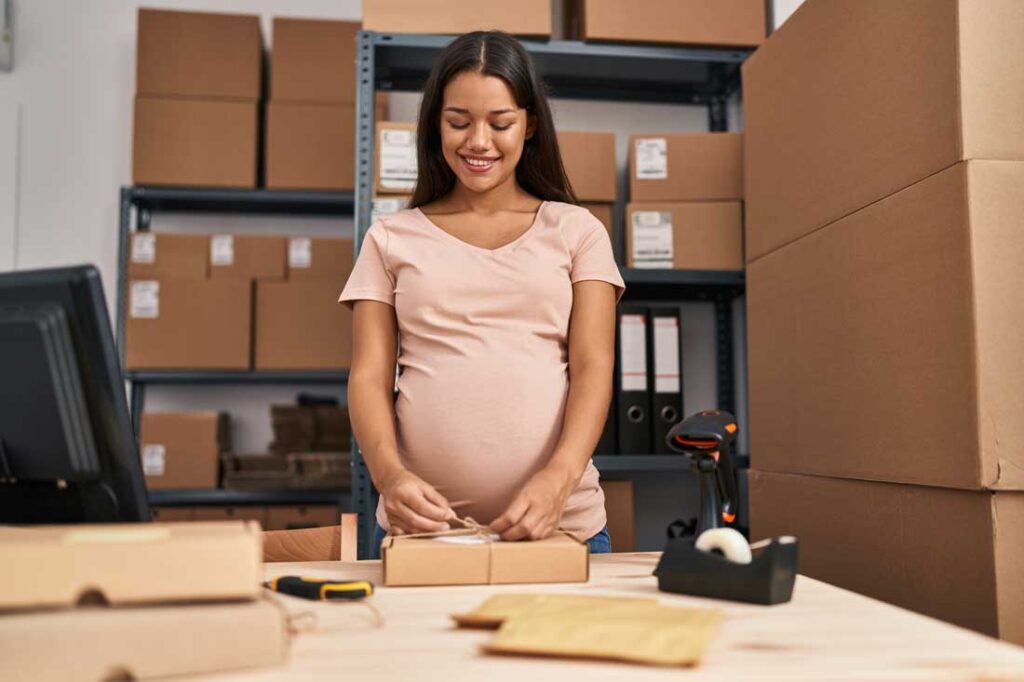Pregnant Americans have a conundrum: They need money most when they are saving for unpaid maternity leave. But sometimes, stress—from their personal lives, or from the very jobs they rely on—can potentially harm their pregnancies causing poor outcomes and may even act as a risk factor for postpartum depression, all while they work hard to prepare for their babies. Though legislation has made some strides to protect and accommodate pregnant people on the job, such as the recent Pregnant Workers Fairness Act, it won’t solve the problem in itself.
Jobs most likely to cause poor pregnancy outcomes
In a January 2023 study, researchers determined which fields are most connected to adverse pregnancy outcomes such as miscarriage and stillbirth. You likely expect the worst jobs are those that include operating machinery and lifting heavy objects. Surprisingly, however, it was those in health and social work who “showed the highest risk of no live births,” while those in manufacturing and health and social work had similar rates of risk for “early abortive outcomes” like miscarriage, “compared with financial and insurance jobs.” Other fields which had an increased risk of no live births were “wholesale/retail trade, education… and public/social/personal service [occupations].” The researchers conclude that “[their] findings highlight the urgent need to assess working conditions to prevent adverse pregnancy outcomes in female workers.”
One of the study authors, Jung-won Yoon, M.D., of the National Medical Center in Seoul, said their research contributed to the amendment of the Industrial Accident Compensation Insurance Act in South Korea, which “[covers] all the abortive outcomes in pregnant women workers,” in a Wiley press release. But there’s more work to do, around the world, to mitigate this issue.
Some experts, such as Lisa Arshawsky, a certified nurse midwife with Claris Health in Los Angeles, explain that it’s hard to say certain fields in particular lead to overly physically or mentally taxing conditions. “It’s very difficult to answer this as working conditions and job requirements vary vastly from career to career. Pregnancy is not a state of disease. It’s a natural process, and most healthy women can do any job that is physically or mentally challenging if they are used to it, and it has already been fulfilling for them,” she says. However, some careers might call for accommodations. “Careers that are physically challenging such as nursing, medicine, delivery drivers, postal workers or those in the food industry where they are required to be on their feet for 12 hours might not be able to continue this form of work.”
Stress in jobs linked to poor pregnancy outcomes
Multiple careers in the top most stressful jobs include medical staff, which aligns with the study’s findings. The innate demands of these jobs, in addition to health care worker shortages since the pandemic, make these types of careers stressful.
“During pregnancy, the body’s levels of cortisol—a hormone released in response to stress—are increased. High levels of cortisol could be associated with preterm birth or low birth weight. It can also cause mothers to experience higher rates of anxiety, depression and fatigue. Stress can also adversely affect fertility,” says Florida-based OBGYN Staci Tanouye, M.D., FACOG. “While the exact mechanisms behind how stress could negatively impact fertility, it is believed that stress hormones can prevent ovulation or disrupt implantation. It’s important to note that stress comes along with most jobs, though—not just manufacturing and health care.”
Physical limitations in pregnancy
From seriously achy backs to consistent hydration needs to higher rest requirements, pregnant individuals often have to take it a bit easier than normal during pregnancy. Some might wonder how much they can lift at physically taxing jobs, or how these positions might impact the baby’s health and well-being.
“On the physical side of things, stress can be caused by physical demands placed on the body. This could include long hours, heavy lifting or physical exertion, as well as a lack of rest or proper nutrition. However, there is limited evidence linking specific fields of work directly to miscarriage and fertility issues,” Tanouye says. She points to an additional study from 2012 that notes some “previous studies have indicated that shift work, long working hours and prevalent workplace exposures such as lifting, standing and physical workload increase the risk of miscarriage, but the evidence is conflicting.” While experts cannot definitively say that lifting will lead to pregnancy loss in every case, she recommends not lifting anything heavier than 25 to 50 pounds on the job or elsewhere, a number that depends on the individual’s fitness level.
“Lifting excessively heavy weight can potentially lead to injuries of lower back and pelvis due to decreased support and increased laxity of joints during pregnancy. This is especially true when proper technique is not used,” she adds.
Other concerns at work include insomnia and sleep-related issues impacting awareness in the daytime, which can be especially dangerous if you are operating machinery. According to a 2021 study, “94.2% of women suffered from fatigue during pregnancy.”
How to limit poor pregnancy outcomes on the job
Whether your employer is the most accommodating person or has no intention of helping with any pregnancy-related concerns, there are some steps you can take to advocate for yourself and your baby at work. Arshawsky recommends:
- Focusing on proper nutrition, especially in the first trimester (try not to skip that lunch break even if you’re nauseous!)
- Drinking 50-70 ounces of water per day for the average size woman, to reduce the risk of UTIs, constipation, preterm labor and more
- Sitting as frequently as possible to rest your back, or consider asking for additional breaks or personal days as needed to get more physical rest
- Getting help with pelvic floor health, as pregnant individuals already have weaker pelvic floors, which can cause low back pain
- Thinking through continuing work at a manufacturing plant or factory with environmental toxic risks by communicating with your doctor
But the experts acknowledge that as legislation protecting pregnant individuals slowly catches up to their needs, you may not have much of a choice. “We also can’t neglect the impact of needing a job to provide financial stability to one’s family. While we as a health care team can provide recommendations for reasonable work accommodations, we also have little input on how an employer may or may not implement these adjustments,” Tanouye says. “And then women have the added stress of determining if they should continue to work in a less than ideal environment in a job that they and their family may heavily depend on. It can lead to impossible decisions, added stress and even guilt.”
Photo by Krakenimages.com/Shutterstock










